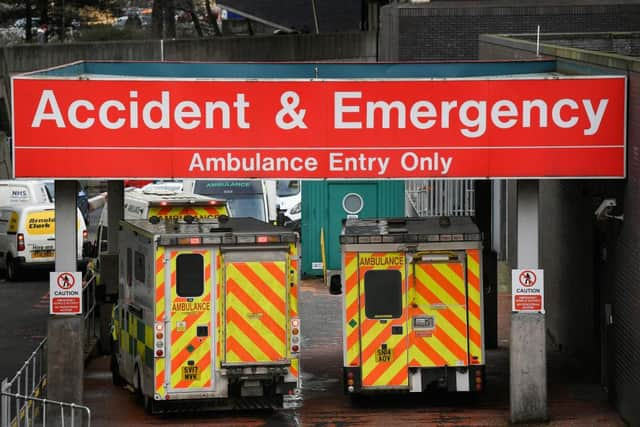Scottish A&E staff shortages impacting patient care, says Royal College of Emergency Medicine
Over 400 more staff members are needed in the next five years, the college said after analysis of a workforce survey.
The survey, including responses from 24 emergency departments across Scotland found staff said they needed a 25 per cent increase in consultants, and a 45 per cent increase in advanced clinical and nursing practitioners and physician associates.
Advertisement
Hide AdAdvertisement
Hide AdStaff also said they needed a fifth more junior doctors, and a 16 per cent increase in emergency nurses.


The RCEM said this means a requirement of 405 more staff members, including 113 more consultants and 180 more junior doctors.
It comes as A&E attendance figures have risen in Scotland in recent months, now reaching above pre-pandemic levels.
During the week ending June 20 there were almost 28,000 visits to A&E.
Of these, 83 per cent were seen within four hours, the Scottish Government target.
Almost 600 patients waited more than eight hours, while 130 people waited more than 12 hours.
Dr John Thomson, Vice President (Scotland) of the Royal College of Emergency Medicine, said the survey data shows A&E departments in Scotland are “not adequately staffed to deliver the highest quality patient care”.
"This has led to an increase in intense pressures on the existing workforce and is very likely to be a contributing factor to the continued deterioration in performance,” he said.
Advertisement
Hide AdAdvertisement
Hide Ad“We have always been proud of Scotland’s performance in Emergency Medicine, ensuring quick and effective care that outperformed the rest of the United Kingdom.
"But, even before the pandemic, the increase in demand put severe pressure on staff, and departments began to struggle to meet the four-hour access standard, but more seriously began to struggle to deliver appropriate treatment to patients, resulting in more delays and longer stays.
“The pandemic certainly exacerbated these issues and now there are some major challenges that face Emergency Medicine in Scotland.”
Dr Thomson warned staff are facing “burnout and exhaustion” after two waves of Covid-19, with some saying they have plans to take early retirement.
A message from the Editor:
Thank you for reading this article. We're more reliant on your support than ever as the shift in consumer habits brought about by coronavirus impacts our advertisers.
If you haven't already, please consider supporting our trusted, fact-checked journalism by taking out a digital subscription.
Comments
Want to join the conversation? Please or to comment on this article.
